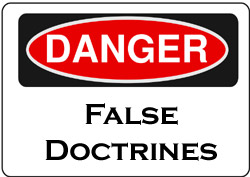DOES THE LETTER OF JAMES SUPPORT THE TRINITY?

Is the Trinity in James? James’ short general letter to early Christians doesn’t have a plethora of references to God, Jesus, and the holy Spirit, but what it does have is more than enough to figure out whether the Trinity doctrine is in the book of James. First of all, notice who James is a servant of:
“James, a servant of God and of the Lord Jesus Christ” (James 1:1 NIV). James identifies himself as serving two distinct personages, namely Almighty God and Jesus Christ. These two are not mysteriously merged together, as Trinitarians assert. Their distinctive separateness is maintained. Notable by absence are references to the Trinity and the holy Spirit. If these are real, why isn’t James serving them?—Perhaps because the Trinity is fictional. He’s not serving the holy Spirit because it is not a person, even though it is real. “The holy Spirit” is called “it” at John 1:32 (ESV); 14:17 (NAB, REB), Acts 2:33; 8:16; 11:15 NAB, and Romans 8:16,26,27 (NAB;REB). Persons are not called “it”. The holy Spirit is God’s “power” (Acts 1:8), not a person.